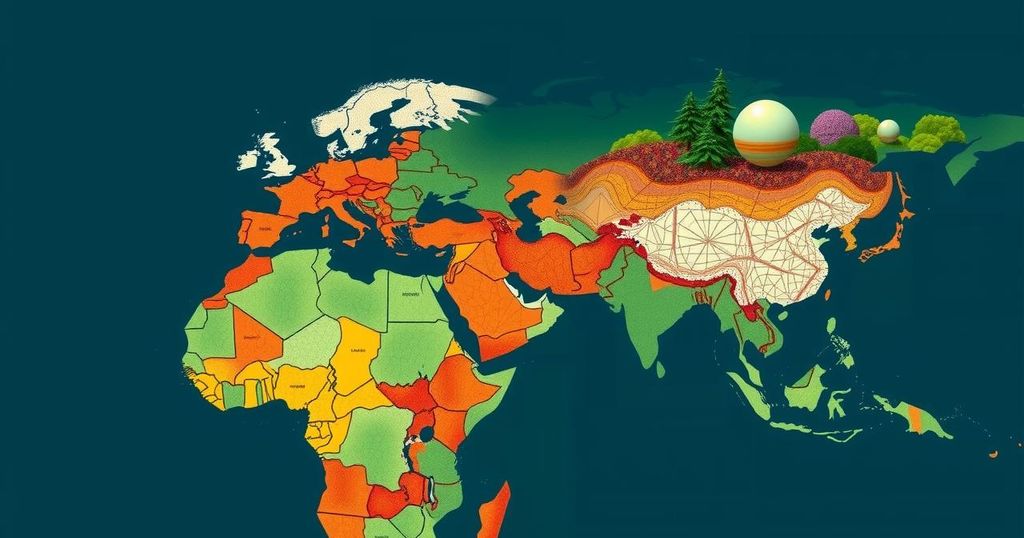Wealthier nations are beginning to compensate poorer countries for damages incurred from climate change, exemplified through the case of a Malawian farmer receiving funds after Cyclone Freddy. Approximately $720 million has been pledged to assist developing nations, but experts warn this amount is inadequate. Ongoing negotiations at COP29 aim to establish guidelines for distributing these funds and addressing the growing financial burden due to extreme weather events.
In the early hours of the morning, floodwaters from Cyclone Freddy surged into Christopher Bingala’s home in southern Malawi. This cyclone, notable for its unprecedented duration, caused severe damage, displacing many families. Although Bingala lost much, he received approximately $750 in compensation, which he used to construct a new dwelling for his family, exemplifying the emerging concept of “loss and damage” funding aimed at assisting victims of climate-related disasters.
Globally, wealthier nations have acknowledged their responsibility to assist poorer countries, who disproportionately endure the impacts of climate change despite their minimal contributions to greenhouse gas emissions. This recognition has culminated in a fund, to which around $720 million has been pledged. However, experts caution that this amount is woefully insufficient as extreme weather events intensify.
During the ongoing COP29 climate summit in Baku, Azerbaijan, discussions focus on determining the financial obligations owed to developing nations as part of an extensive “climate finance” initiative. Philip Davis, Prime Minister of the Commonwealth of the Bahamas, emphasized the imperative that affluent nations recognize their contributions to the climate crisis and take responsibility for its consequences.
The devastation wrought by Cyclone Freddy displaced over 650,000 individuals in Malawi alone, leading to critical food shortages for many affected families. Bingala’s journey reflects the struggle of thousands who rely on subsistence farming and fishing without any formal safety net. The cash assistance he received facilitated his relocation to a less vulnerable area, offering hope for his family’s future.
Notably, Scotland has taken the pioneering step of allocating funds specifically for loss and damage compensation, with aid distributed by GiveDirectly, a nonprofit organization dedicated to providing immediate financial relief. This initiative, which has already benefited 2,700 families in Malawi, aims to foster resilience in communities facing the realities of climate change.
As the demand for loss and damage funding continues to escalate due to the increasing frequency and severity of climate-related disasters, developing countries seek broader financial support that extends beyond immediate disaster recovery. At the COP29 summit, deliberations include considerations for assisting communities facing long-term challenges posed by climate change, such as necessary relocations due to rising sea levels.
The global community stands at a crossroad where the need for immediate action is pressing. If the wealthier nations do not enhance their contributions to climate resilience efforts, they ultimately risk exacerbating future crises that may transcend geographic and political borders.
The phenomenon of climate change has disproportionately affected low-income countries that contribute minimally to global greenhouse gas emissions. Due to their geographical vulnerabilities and limited financial resources, these nations face severe impacts from extreme weather events. Acknowledgment of this disparity has prompted wealthier nations to establish funds for “loss and damage” compensation, aiming to support affected communities in rebuilding their lives following climate-induced disasters. As the effects of climate change intensify, the demand for effective funding and support mechanisms is critical for developing nations to foster resilience and sustainability in the face of ongoing challenges.
In summary, the recent developments regarding climate change compensation highlight a critical need for international cooperation to address the financial burdens faced by low-income nations. Initiatives such as the loss and damage fund and the exemplary support demonstrated by Scotland underscore the urgent necessity for a systemic approach to financing climate resilience. As the global community grapples with the consequences of climate change, a collective commitment from wealthier nations is essential to prevent further humanitarian crises and support vulnerable populations.
Original Source: www.wprl.org






